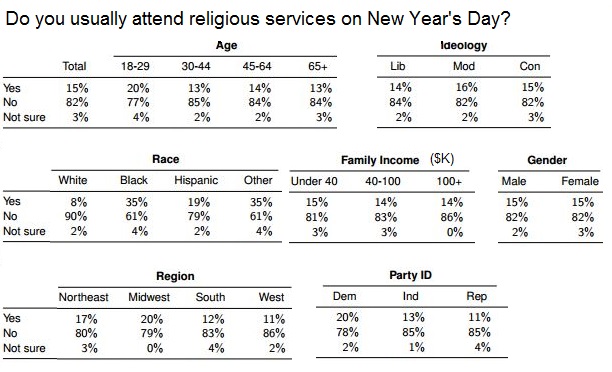The weekly column on demographics and secularism
by Jordan Auburn and Johnny Monsarrat
Just like Christmas,┬á New Year’s Day is also a Winter Solstice event to celebrate┬áhope for the future, but it has little to do with religion. An┬áAssociated Press poll taken in New York in 2013, found┬áthat┬áwhen the clock strikes 12,┬á83% of Americans want to be with their family, 1% with co-workers, and 2% with a pet. Some┬ádidn’t plan to celebrate or had no one to spend the evening with, and just┬á3% of Americans┬áwant to be with God, Jesus, or a┬áreligious congregation.
Then on New Year’s Day, according to a 2014 YouGov Poll,┬áWhat are you doing New Year’s Eve?, only 15% “usually” attend religious services, with 13% planning to actually go that year.

That 15% figure, with a 3% survey margin of error, doesn’t vary much across political identification, gender, US region, or family income. But surprisingly, younger people are slightly more likely to attend services on New Year’s Day (20%), as are African-Americans (35%) and other non-white, non-Hispanics (35%). It’s also a popular event, with the YouGov report showing that 76% of Americans like New Year’s a little or a lot, and 84% say they’ll watch the ball drop on television or in person in New York.
Although most won’t attend services, 66% of Americans will say a prayer on New Year’s, according to a┬áRasmussen Reports poll. And most consider it a personal event, with only 21% attending a party, or 46% in a surely┬áunbiased┬ápoll by a wine company. And 25% will save their prayers until┬ámidnight, making one wonder┬áhow much of that prayer is religiously seeking direction and how much simply an affirmation of New Year’s resolutions they want God to witness.
So at least in the West, New Year’s Eve and Day are secular and allow┬áall people to mix, not self-segregate by religion. What about in the East?
Celebration in the East
February brings the Chinese New Year, in which 1.4 billion Chinese will celebrate the year of the Monkey, which is also a secular event.
The Hirji (or Islamic) New Year, which is celebrated in October,┬ábegan in 622AD to mark the emigration of the Prophet from Mecca to Medina, a city he co-founded┬áwhere everyone would be free to practice their own religion. The Hirji New Year begins Muharram, a month of peace, and while it is religious for some, according to an article in the Washington Times, Muslims mainly celebrate just two days, Eid al-Adha, the Feast of Sacrifice, and the end of Ramadan. “New Year’s is really celebrated as a cultural holiday, not a particularly religious one,ÔÇØ said Imam Johari Abdul-Malik, director of outreach at the Dar Al-Hijrah Islamic Center in Falls Church, Virginia.
A Secular World
People all over the world prefer┬áa secular New Year’s celebration, free from religious services. Even according to┬áa professor at the University of Chicago Divinity School who tries to claim New Year’s as religious,┬áa traditional ritual feels like a religious ritual. But maybe that’s just proof┬áthat people don’t need religion to have traditions and annual rituals. Sadly for the annual tradition of a kiss on New Year’s, while only 10% expect to┬ákiss nobody┬áat midnight,┬ámore people will kiss their pet at midnight than will kiss a friend. Happy New Year.
